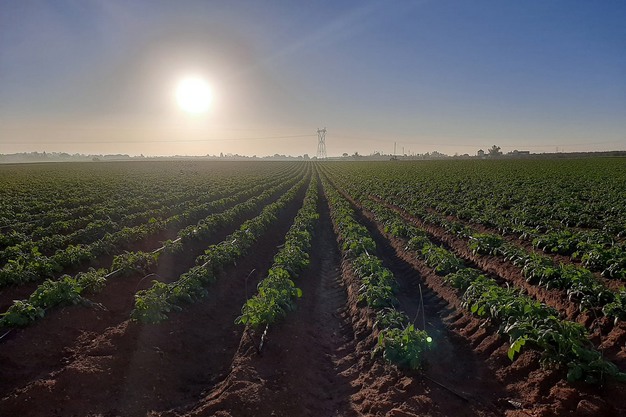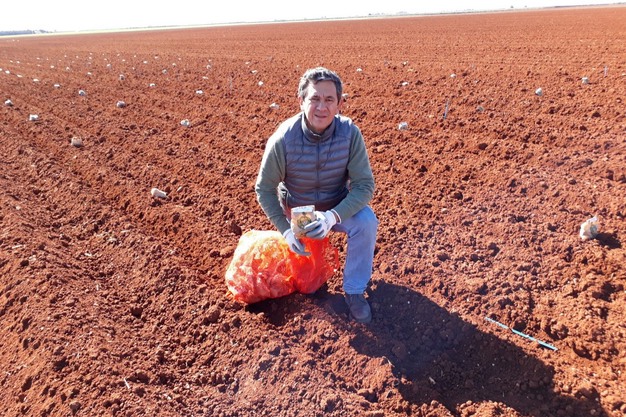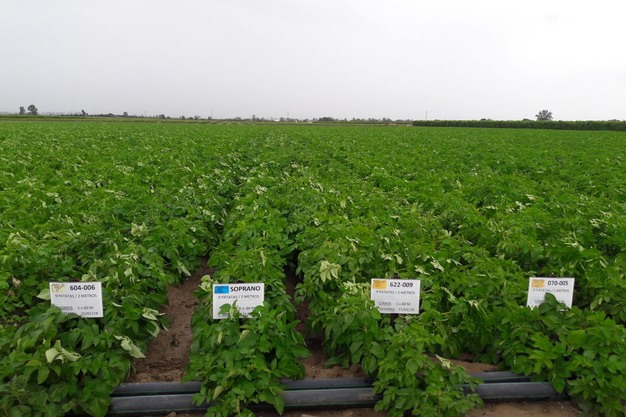The potato planting campaign is practically finished in the province of Seville. Spanish growers are affected by the high costs of seed potatoes due to their scarcity in the main Central European producing countries.
"The weather has allowed us to plant at an optimal time and in the right conditions. There has been a slight reduction of the acreage compared to the previous campaign, but it is still larger than initially expected, given the drought situation," says Javier Boceta, director of Meijer Ibérica.

The biggest problem that producers have faced has been the high price of seed potatoes, as well as the scarcity of certain varieties and the very large calibers. "This has caused cultivation costs to increase by between 700 and 1000 euros per hectare compared to previous campaigns," says Boceta.
"A cost increase of around 10% represents a considerable increase in risk. Our campaign is very short and a delay in the harvest due to the weather can seriously affect the price. We are always exposed to such situations, but to this we must add the likely increase in the supply of potatoes from third countries, such as Egypt, due to the removal of tariffs. However, we remain optimistic as regards the quantity and quality," says Javier Boceta.
According to the director of Meijer Ibérica, the ban of phytosanitary products across Europe has seriously destabilized this sector. "Insecticides which were essential for the control of aphids (virus vectors in seed potatoes) have been withdrawn from the market. In France, the Netherlands and Germany, which account for the largest seed potato productions, about 6,400 hectares (8% of the acreage) have been replanted with less risky crops. This, together with the adverse weather conditions, has led to a shortage."
"Our company Meijer Ibérica expects the acreage in the next campaign to be reduced by another 2000 hectares, so we are talking about a structural problem. The high prices paid to producers do not make up for the risk of a loss in the value due to virosis. And if the summer is hot, it will be impossible to control the aphids," says Boceta.

Javier Boceta, director of Meijer Ibérica.
"In France, all that's left to fight aphids is mineral oils. It's like sending a soldier to war with bows and arrows. Producers prefer a lower profitability, but more security, so the crop is being abandoned," he says.
"Another decisive factor is the shortage of labor, which is observed across Europe. There's a lack of skilled workers able to distinguish infected plants from healthy ones. The growers who abandon the crop are unlikely to plant it again in the future," says Javier Boceta.
"The 'Farm to Table' strategy has already suffered a heavy blow, as the European Parliament has removed one of its basic pillars, that of the sustainable use of phytosanitary products, and European agriculture is at war with Brussels. It is already very clear that the situation will need to be rectified. The problem is that if this rectification is delayed, some sectors may need years to go back to normal. It is imperative for the list of banned insecticides to be quickly reviewed," he says.
Parallel to this, there has been a reduction of the tariffs imposed to third countries, and the political discourse has revolved around "mirror clauses." "In short, the idea is to force third countries to meet our phytosanitary regulations if they want to export to Europe. However, in June 2022, a report from the Commission to the European Parliament and the Council said that 'the application of EU rules to imported products must be in full compliance with WTO rules, and economic objectives such as increasing competitiveness or promoting a level playing field are not valid under Article 20 of the GATT. Consequently, if we go to a European chain to buy a product, it will have been grown with severe restrictions if it is of European origin - with a high production cost - but not if it is imported," says the director of Meijer Ibérica.
Wageningen University (the Netherlands) warned prior to the publication of the "Farm to Table" strategy about a fall in EU exports, a growth of imports, price increases and significant reductions in the yields. The United States Department of Agriculture (USDA) warned of a negative impact on access to food in third countries (Africa), as well as on production, competitiveness and self-sufficiency of the EU.

"I can confirm that, as of 31 December 2023, seed potato exports from the Netherlands to Africa have fallen by 36% compared to the same period last year. Potatoes are the crop that provides the most calories with the least water consumption. It is an essential food in Africa. I hope that these countries have been able to import grain to make up for that shortage, but it is clear that our policy is not only harming Europe."
"The deadlines of the Brussels strategy are not taking into account those required for research and the development of new technologies. We now have varieties resistant to mildew (the commercial phase of the Lady Jane is now starting) and with 30% lower nitrogen needs. However, it could take at least 15 years for the market to have enough volumes. Any technological innovation takes many years to be accepted by the market."
 For more information:
For more information:
Javier Boceta
MEIJER IBÉRICA
T:+ 34 954 61 16 26
M: + 34 649 98 21 59
[email protected]
www.meijerpotato.com/es/










